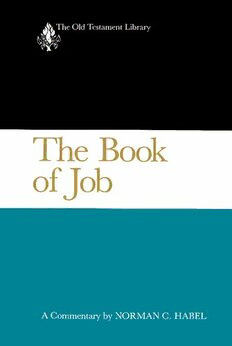Table Of ContentISBN 0-664-22218-8
,!7IA6G4-cccbif!:t;K;k;K;k
6.00 x 9.00 6.00 x 9.00
1.280
,!7IA6G4-cccbif!
NORMAN C. HABEL
THE BOOK OF JOB
THE OLD TESTAMENT LIBRARY
General Editors
PETER ACKROYD, university of London
JAMES BARR, Oxford University .
BERNHARD W. ANDERSON, Princeton Theological Seminary
JAMES L. MAYS, Union Theological Seminary, Richmond, Virginia
Advisory Editor
JOHN BRIGHT, Union Theological Seminary, Richmond, Virginia
NORMAN C. HABEL
1H1EE001K
Of JJOJE
A Commentary
The Westminster Press
Philadelphia
Copyright © 1985 Norman C. Habel
Published by The Westminster Press®
Philadelphia, Pennsylvania
PRINTED IN THE UNITED STATES OF AMERICA
4 6 8 9 7 5 3
Library of Congress Cataloging in Publication Data
Habel, Norman C.
The Book of Job.
(The Old Testament library)
Bibliography: p.
1. Bible. O. T. Job-Commentaries. I. Bible. 0. T.
Job. English. 1985. II. Title. III. Series.
BS1415.3.H29 1985 223'.107 84-21580
ISBN 0-664-22218-8
Dedicated to Ms. Jan Orrell
CONTENTS
Preface 9
Abbreviations 11
Selected Bibliography 13
Introduction 21
1. Scope and Format 21
2. The Narrative Plot 25
3. Integrity, Setting, and Date 35
4. Literary Features and Their Significance 42
Form and Focus 42
Structure and Parallelism 46
Repetition, Allusion, and Irony 49
The Legal Metaphor 54
Imagery and Analogy 57
5. Message and Meaning 60
Appendix: The Narrative Plot: An Outline 70
Commentary
Chs. 1-2 The Affliction of Job 75
3 Job's Cries Against His Origin 98
4-5 The Counsel of Eliphaz the Friend 112
6 Job's Expose of False Friends 137
7 Job's Complaint Against God the Watcher 151
8 Bildad's Ancient Parable of the Two Plants 167
9-10 Job on the Futility of Litigation 178
8 Contents
11 Zophar on God's Inscrutable Wisdom 201
12:1-13:5 Job on Knowledge and Wisdom 211
13:6-28 Job's Pretrial Declaration 223
14 Job's Unorthodox Hope 233
15 Eliphaz on Knowledge and Retribution 245
16-17 Job's Complaint Against Friend and Foe 262
18 Bildad on the World of the Wicked 279
19 Job's Hope of a Redeemer 289
20 Zophar on the Fate of the Wicked 309
21 Job's Disputation on the Wicked 320
22 Eliphaz' Indictments of Job 331
23 Job's Quest to Face God 344
24 On Delayed Retribution 351
25:1-6; 26:5-14 [Bildad] on God's Cosmic Design 364
26:1-4; 27:1-12 Job's Oath of Integrity 375
27:13-23 [Zophar] on the Destiny of the Wicked 383
28 Poem on the Quest for Wisdom 388
29 Job's Speech of Remembrance 402
30 Job's Final Complaint 413
31 Job's Oath of Purity 423
32 The Person and Apology of Elihu 440
33 Elihu's Case Against Job 455
34 Elihu's Defense of El's Justice 472
35 Elihu's Defense of El's Detachment 486
36-37 Elihu's Second Defense of El's Justice 494
38:1-40:5 Yahweh's Defense of His Cosmic Design 517
40:6-41:26 [41;34 Eng.] Yahweh's Control of Behemoth
and Leviathan 550
42 The Restoration of Job 575
PREFACE
The task of writing a commentary on a classic work like Job is a daunting
and humbling experience. No exegete can gain complete mastery of a text
which is so complex and unclear at many points. No critic can do complete
justice to the enormous volume of exegetical comment and textual emenda
tion associated with the book of Job in a commentary of this length. Nor
can all of the numerous contemporary and ancient techniques of interpret
ing a biblical text be explored fully in connection with each unit of analysis.
Every critic makes a selection of method, materials to be covered, and
scholars to be cited. In this commentary we have chosen to take into
account a number of factors which complement the work of past exegetes
and provide a focus for interpreting the book as a whole.
First, we have weighed the research of recent scholars to ascertain the
most significant findings for a literary and theological study of the text.
Especially important, for example, are the studies on the function and
language of the legal metaphor in the book of Job (Scholnick, Dick, Rob
erts). Yet the text of the commentary is written in such a way as to be
eminently usable by students, teachers, and laypersons interested in Job, as
well as by biblical scholars and literary critics.
Second, a major focus of this commentary is on the literary features
exhibited in the book of Job. Our literary analysis, however, is not divorced
from the wider exegetical task. In a highly literary work like Job, the artistic
and the theological are closely interwoven. Our interpretation takes into
consideration how literary structures, imagery, motifs, and techniques are
employed to convey and color the message of the text. The meaning of the
book of Job is found in the interplay of literary design and theological idea.
Third, this commentary treats the book of Job as a literary totality. We
do not exclude the possibility of various stages of oral and written develop
ment for the book of Job (Urbrock, Fohrer, Maag). In spite of extensive
research, however, these stages of development remain hypothetical. The
text we possess can be interpreted as a literary whole integrating prose and
poetic materials into a rich paradoxical totality. Thus our interpretation is
regularly concerned with the interrelationship of diverse sections, speeches,
and themes throughout the book of Job. Admittedly, the text has suffered

